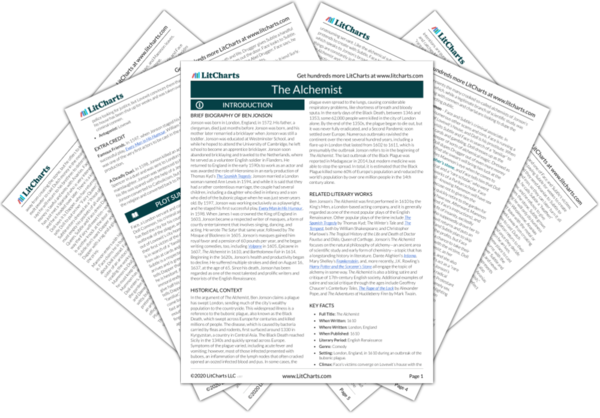Throughout The Alchemist, Ben Jonson makes repeated references to the philosopher’s stone—an alchemical substance that is said to transform base metals like copper and tin into gold and silver and also produce the elixir of life, an additional substance which promises to give eternal life and youth to anyone who consumes it. In the play, the stone represents alchemy as an entire field, but it also symbolizes deception and greed. Subtle is a con who claims to be an alchemist in possession of the philosopher’s stone, and his victims, Abel Drugger, Sir Epicure Mammon, and the Anabaptists, Ananias and Tribulation Wholesome, each want to get their hands on the stone. Subtle, of course, doesn’t have the stone, and Jonson likewise implies that no alchemist, real or imagined, has access to the stone. Jonson appears to put little stock in alchemy, especially the philosopher’s stone, which was considered a legitimate branch of study in Jonson’s time.
Each of Subtle’s victims want the philosopher’s stone to satisfy selfish and greedy ends. Abel Drugger wants the stone to bring him wealth and guarantee his new apothecary shop is successful, and Sir Epicure Mammon wants the stone to turn all the metal in his house, and all the metal in England, into gold. He also wants the stone to secure him the elixir of life, which he is hoping will give him unlimited sexual prowess and stamina. The Anabaptists, Ananias and Tribulation Wholesome, want the stone to selfishly advance their radical religious beliefs, which will be much easier with endless money and the influence that comes along with it. According to legend, the philosopher’s stone can only be created or possessed by those with pure and pious intentions that promise to serve the greater good; however, all of Jonson’s characters are lustful and greedy, and they plan to use the stone to deceptive ends that fulfil their own needs rather than those of broader society.
The Philosopher’s Stone Quotes in The Alchemist
If thou beest more, thou art an understander, and then I trust thee. If thou art one that tak’st up, and but a pretender, beware at what hands thou receiv’st thy commodity; for thou wert never more fair in the way to be cozened than in this age in poetry, especially in plays: wherein now the concupiscence of dances and antics so reigneth, as to run away from Nature and be afraid of her is the only point of art that tickles the spectators.

Unlock explanations and citation info for this and every other The Alchemist quote.
Plus so much more...
Get LitCharts A+And you, too,
Will give the cause, forsooth? You will insult
And claim a primacy in the divisions?
You must be chief? As if you only had
The powder to project with? And the work
Were not begun out of equality?
The venture tripartite? All things in common?
Without priority? ’Sdeath, you perpetual curs,
Fall to your couples again, and cozen kindly
And heartily and lovingly, as you should,
And lose not the beginning of a term,
Or, by this hand, I shall grow factious too,
And take my part, and quit you.
Methinks I see him entering ordinaries,
Dispensing for the pox; and plaguy houses,
Reaching his dose; walking Moorfields for lepers;
And offering citizens’ wives pomander-bracelets
As his preservative, made of the elixir;
Searching the spittle, to make old bawds young;
And the highways for beggars to make rich.
I see no end of his labours. He will make
Nature ashamed of her long sleep, when art,
Who’s but a stepdame, shall do more than she,
In her best love to mankind, ever could.
If his dream last, he’ll turn the age to gold.
For I do mean
To have a list of wives and concubines
Equal with Solomon, who had the stone
Alike with me; and I will make me a back
With the elixir that shall be as tough
As Hercules, to encounter fifty a night.
I will have all my beds blown up, not stuffed;
Down is too hard. And then mine oval room
Filled with such pictures as Tiberius took
From Elephantis, and dull Aretine
But coldly imitated. Then, my glasses
Cut in more subtle angles, to disperse
And multiply the figures as I walk
Naked between my succubae.
Pray you, sir, stay.
Rather than I’ll be brayed, sir, I’ll believe,
That alchemy is a pretty kind of game,
Somewhat like tricks o’the cards, to cheat a man
With charming.
Good brother, we must bend unto all means
That may give furtherance to the holy cause.
Sweet Madame, let me be particular—
Particular, sir? I pray you, know your distance.












